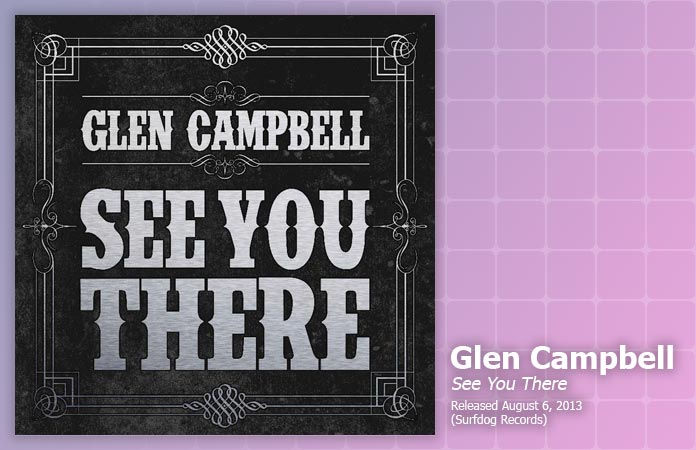Music Review: Glen Campbell, See You There
Published on September 10th, 2013 in: Current Faves, Music, Music Reviews, New Music Tuesday, Reviews |There’s debate on the Internets regarding whether releasing Glen Campbell’s See You There is exploitative. Campbell is suffering from Alzheimer’s disease, and some say this album—stripped down versions of his greatest hits—is just an attempt to cash in. I disagree, utterly. See You There is touching and triumphant—and painful to hear, but in a good way.
These songs are intimate and pure. In my notes I refer to them repeatedly as “simple,” but they aren’t. They’re unembellished and not overdone. There’s no production trickery, making his voice sound like it did when he was 30. He’s earned his voice. It’s well worn and lived in. It’s honest.
“Postcard From Paris” is full of palpable yearning, and the simple backing vocals do nothing but enhance. It’s restrained and elegiac and painfully romantic. “By The Time I Get To Phoenix” somehow becomes even more heartbreaking (and it’s a damn sad song already).
Glen Campbell’s voice on “Wichita Lineman” surprised me. He’s so gifted and his phrasing is elegant. The production is spare, but not sparse. He hits the high notes almost effortlessly on “Hey Little One.” He soars again on the high notes of “True Grit.” That one features nice slide guitar and the delightful huskiness of his voice. It all comes together to sound quietly epic, like a vast plain.
“What I Wouldn’t Give” wouldn’t be out place on the soundtrack to a David Lynch movie, with handclaps and melty guitar. Slow-burning and striving, his last sung “I’ll see you again” is resolute and hopeful. It’s a lesson on how to sell a line—by actually believing it.
“Galveston” becomes a song to be sung by a campfire. It’s a fascinating interpretation, a bit sea shanty-esque near the middle bit, with an overblown guitar solo that clashes with the more peaceful nature of this take. “Rhinestone Cowboy” becomes stark and breathtaking, a rough around the edges, restrained performance. When he sings about his “smile to hide the pain” you will believe it.
“Waiting On The Comin’ Of My Lord” is folky and tender, with delicate lead guitar and subtle banjo. It is revisited in mariachi form, because everything is better with maracas. The addition of horns and strings here is graceful.
See You There feels different than other end-of-career country albums. Glen Campbell can still hit the high notes and his voice is still powerful. It’s beautiful and moving and meaningful. Likely his last record, it could have been terribly sad. Instead, it feels like a lovely parting gift from a man who has talent to spare. It’s bittersweet, but sometimes the best things are.
See You There was released on August 6 through Surfdog Records.

Time limit is exhausted. Please reload the CAPTCHA.